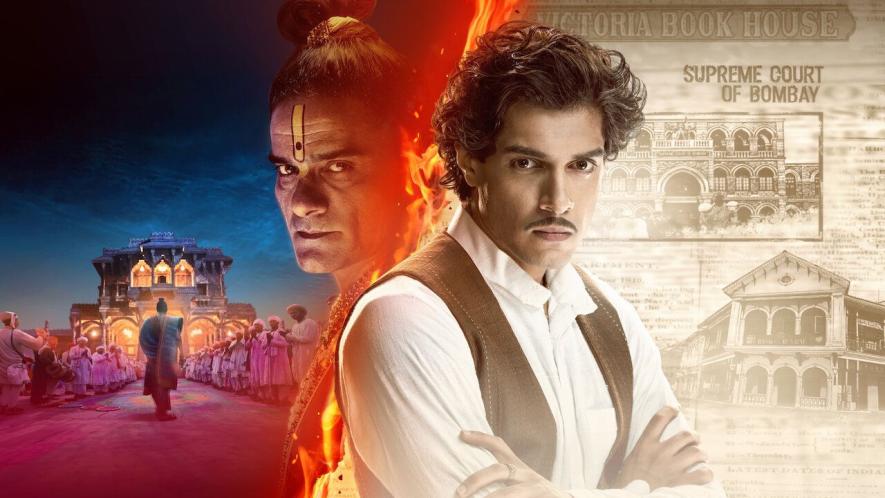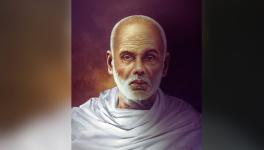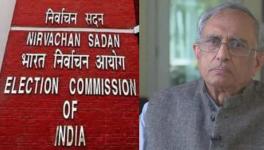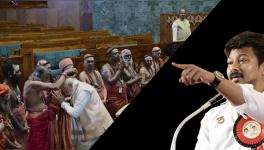Maharaj: The ‘Das’(Sevak) Who Won a Battle Against ‘Raj’(King)

Image Courtesy: Netflix
The streaming of the film Maharaj following a recent Gujarat High Court ruling allowing it after a brief stay, has intensified curiosity among viewers after its OTT release on Netflix. Some perceive the movie as controversial regarding religious sentiments. Nevertheless, Maharaj continues to be seen as a significant and provocative story, potentially groundbreaking in its exploration of important societal issues.
The movie is based on a 2013 book titled, Maharaj, written by Gujarati author Saurabh Shah that focuses on a landmark libel case of 1862 fought in the Supreme Court of Bombay involving Jadunathji, aka JJ, a prominent Vaishnavite figure, against social reformer Karsandas Mulji.
Mulji had criticised the exploitation of power by a revered spiritual leader known as Maharaj. In the 1980s, Maharaj tells the story of Karsandas Mulji (played by Junaid Khan), a Gujarati journalist, and an advocate of women's rights, such as widow remarriage, women's education, and the banning of the veil. He was also a staunch critic of the caste system and related atrocities. He boldly confronts Jadunath Maharaj, (played by Jaideep Ahlawat), a religious leader who manipulates and sexually exploits his female followers through exploitative rituals like charan seva, using his position for personal gain.
After witnessing his fiancee Kishori falling victim to Jadunath's immoral actions in his haveli, Karsandas resolves to expose the religious leader. He also tries to make Kishori understand the predatory behaviour of JJ but she justifies the significance of charan seva and claims that she is fortunate enough to avail of the same. They have an argument where Karsan says, “We need the wisdom to know right and wrong, and I don't question your trust, but yes I can question your blind trust”. Further, he adds, “If the door is locked and the key is in one’s hand but one remains prisoner then the captivity is one’s own choice”.
Later, Kishori discovers the harsh reality of JJ's control over his followers when she catches her sister with JJ in a compromising position. This discovery deeply affects Kishori, causing her to reflect repeatedly on Karsan's advice to break away from the system and think critically. Kishori cannot gather strength to meet Karsan and dies by suicide. It is her suicide note that paves the way for Karsan to start the struggle to unmask the reality of JJ.
Jadunath files a defamation case against Karsan for writing and publishing an article in the newspaper, Satyaprakash, detailing Jadunath's inappropriate activities. In his article, Karsan also mentions fathers and husbands who offer their unmarried daughters and newly married wives as sexual sacrifices to Maharaj, believing it to be a religious duty.
It is important here to note that even though the movie is set in the pre-Independence era, its narrative and the struggle against 'bhakt culture' remain quite pertinent in today's context. In the Hindu-majority nation of over a billion people, a widespread network of godmen, gurus, and swamis, babas often find themselves implicated in sexual crimes. Despite this, many Indians remain captivated by these charismatic figures who exploit their followers' trust to amass immense wealth.
In 2004, police faced staunch resistance from supporters of Rampal Singh Jatin, a controversial guru from Haryana, before finally apprehending him. Their investigation uncovered shocking details about his personal life, which contrasted sharply with his public persona as a spiritual leader.
Known for his opulent lifestyle, Rampal preferred the company of ‘hostesses’ whom he referred to as ‘sadhikayaen’. Despite claiming to be a reincarnation of the mystic poet, Kabir, Rampal lived a life of luxury where women played a central role, according to a news report published in 2017 by DW.
Another prominent figure, Asaram Bapu, faced accusations of rape from a teenage girl in 2013, alleging that he had enticed her with promises of spiritual purification. This incident was not the first time he had been accused of criminal behaviour, as earlier, charges linked to the deaths of two boys in his Gujarat retreat in 2008 had also surfaced. Despite staunch defences from his close aides, claiming the charges were baseless, Asaram Bapu was arrested.
Similarly, Mahendra Giri, 65, was arrested in 2013 for unlawful confinement and repeated sexual assault of a 24-year-old woman in his ashram over four months. Shockingly, the victim's husband and mother-in-law were complicit in these crimes and all three were imprisoned. In 2010, another controversial figure, Swami Nityananda, faced arrest after a leaked video revealed him engaging in sexual acts with a Tollywood actress.
However, upon closely examining the movie's plot, we can see the immense challenges Karsandas faced in confronting societal norms, traditions, and most significantly, JJ's dominance over people's lives. As a reformist, he often faced backlash for his progressive ideas by not supporting blind faith who advertise, marketise, and sell themselves as the messenger of God.
Karsan was writing for Dadabhai Naoroji’s Anglo-Gujarati newspaper, Rast Goftar, about various social evils. He made several attempts to write stories about the predatory behaviour of JJ but Naoroji refused to give him that space, as most of his writings could have either hurt the religious sentiments of the people or might have challenged the hegemony of JJ. Therefore, Karsan started his own magazine and titled it’s the same, Satya Prakash. After several failed attempts Satya Prakash could reach out to the people. It is significant to note here that Karsan was not alone in his battle against the custodian of religion. Viraaj (played by Sarvari), a spirited woman unexpectedly appears and volunteers as a proofreader. As her backstory unfolds, she shares as to how at the age of 16, she was forced to do charan seva by her parents.
In the final half-hour of the movie, Karsan refuses JJ's offer to compromise. JJ goes as far as tampering with all the witnesses before they can testify. However, the story takes a dramatic turn when Karsan’s widowed aunt unexpectedly appears in court to testify against Maharaj. Following her testimony, numerous women independently come forward to expose JJ's exploitative behaviour. It's noteworthy that a significant number of women from the families were engaged in charan seva. Based on the witnesses, the court frees Karsandas from the defamation case.
Now the question arises as to why people fall prey to godmen? The author of Gurus: Stories of India’s Leading Babas, Bhavdeep Kang believes that the godmen are hardly held accountable by their devotees. The reasons are enormous; as mostly these godmen are their family confidante, counsellors, the panacea of dissonance and anxiety, advisors on both personal and professional fronts, and all these above roles develop a syndrome called ‘dependency syndrome’. There is a strong faith in miracles and the belief that these godmen can alleviate suffering.
All the above above-stated reasons string together to make believers even die for these godmen. In both the pre-colonial (where the movie Maharaja is set) and post-colonial eras, Karl Marx’s idea on religion is still relevant. He metaphorically writes, “Religion is the sigh of the oppressed creature, the heart of a heartless world, and the soul of soulless conditions. Religion is the opium of the people and the role of religion is a metaphysical balm for the real suffering in the universe and suffering (A Contribution to the Critique of Hegel's Philosophy of Right: 1843).
The major takeaway from Maharaj is that there's a significant scene where Karsan receives a profound lesson from a character who says, “Simply telling people they're wrong isn't enough. Real change comes from giving them the chance to reform and rehabilitate.” This is why Maharaj resonates with me deeply. It's not just about making Jadunath aware of his mistakes but also about implementing a landmark judgment aimed at fostering true transformation.
To sum up, the film does not intend to offend or disrespect religious sentiments. It concludes that a sect's unity and principles are more significant than any individual or isolated incident. Despite concerns about potential communal tensions, the Vaishnav sect and its followers have continued to thrive, remaining a proud and integral part of India's social, cultural, and religious tapestry.
The writer is an assistant professor, Department of Sociology, Maitreyi College, University of Delhi. The views are personal.
Get the latest reports & analysis with people's perspective on Protests, movements & deep analytical videos, discussions of the current affairs in your Telegram app. Subscribe to NewsClick's Telegram channel & get Real-Time updates on stories, as they get published on our website.
























